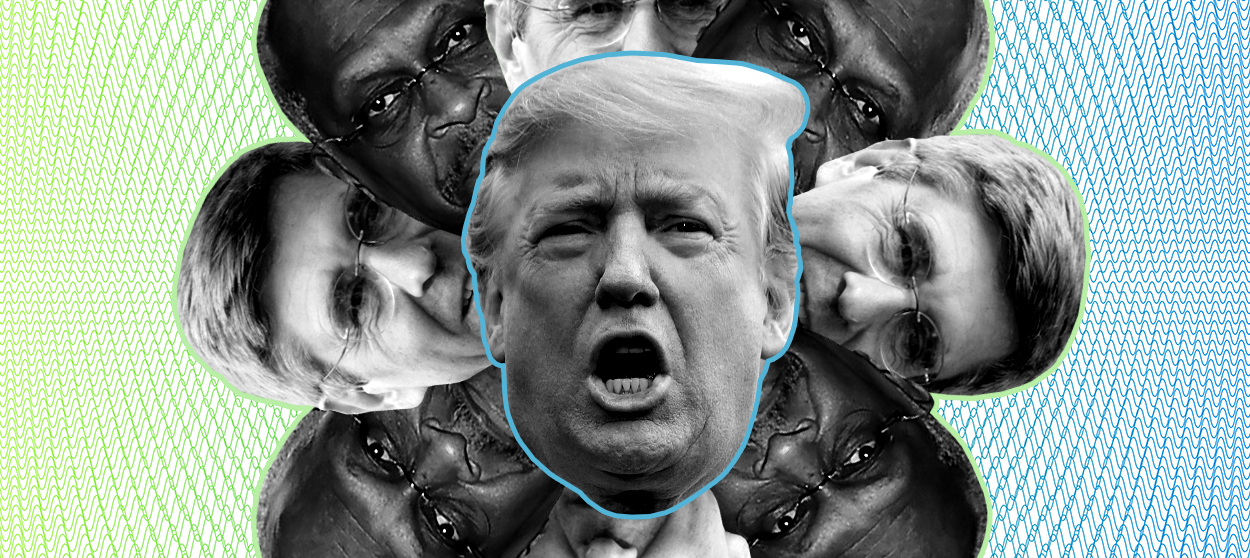Trump's Fed picks are awful — but not for the reasons you think
Critics say Trump's nominees threaten the Fed's credibility and independence. But the Fed has been a failure for years.


A free daily email with the biggest news stories of the day – and the best features from TheWeek.com
You are now subscribed
Your newsletter sign-up was successful
Make no mistake about it: President Trump's latest picks for the Federal Reserve are terrible. A cursory study of Stephen Moore and Herman Cain shows they have no substantive or coherent views on monetary policy; they're simply apparatchiks and yes-men for the current leadership of the Republican Party. It's very likely Cain's nomination will be unsuccessful, thanks in part to resounding rejections from a handful of key Republicans.
Still, it's worth noting that not all arguments against these nominees stand up to scrutiny. The loudest objection suggests that putting Moore and Cain on the Fed would jeopardize the central bank's independence, undermine the Fed's ability to properly stabilize the economy, and threaten to deliver us into a Venezuela-style inflation crisis. This line of thinking assumes that the Fed is one of our last remaining credible, functioning, and non-political institutions. But that's simply not true. Moore and Cain can't ruin the Fed, because the Fed has been a failure for years.
By any reasonable standard, the Fed's "credibility" is a modern day myth. The central bank's ability to set interest rates gives it immense power over Americans' economic fortunes: When the Fed raises interest rates, it holds down inflation, but at the cost of higher unemployment and slower wage growth for workers. (Lowering interest rates potentially allows more inflation, but also allows more economic growth.) Thus the Fed's dual mandate from Congress: to keep inflation low and stable, but also to maximize employment. As the central bank's many defenders point out, it absolutely nailed low and stable inflation over the last few decades. But it's completely failed on the "maximizing employment" front. That failure laid much of the foundation for modern wage stagnation, inequality, the death of unions, rampant household insecurity, and a host of other social ills.
The Week
Escape your echo chamber. Get the facts behind the news, plus analysis from multiple perspectives.

Sign up for The Week's Free Newsletters
From our morning news briefing to a weekly Good News Newsletter, get the best of The Week delivered directly to your inbox.
From our morning news briefing to a weekly Good News Newsletter, get the best of The Week delivered directly to your inbox.
Yet the economists, policymakers, and yes, even journalists, who actually get to judge the Fed's "credibility" all tend to be upper class, which means the narrative that gets passed around about the Fed is overwhelmingly positive. After all, these people rarely suffer when unemployment spikes, even in the depths of a crisis like the Great Recession. Traditional Fed nominees themselves are equally elite. They often hail from a small and rarified socioeconomic slice of the population. Meanwhile, the people who do face the regular threat of joblessness and inadequate pay whenever the Fed decides to tamp down prices — low-income workers and minorities and other vulnerable Americans — remain far removed from the conversations surrounding the Fed.
Putting Trump's nominees on the Fed Board would not lead the Fed down the path of partisanship — it is already too far gone. As Neil Irwin perhaps inadvertently points out at The New York Times, the Fed's monetary policy decisions inherently "pit the interests of workers against owners of capital, and those of banks against those of consumers." Those decisions are nothing if not "political." Fed officials routinely characterize empowered workers and labor movements that can actually force employers to meet their demands as threats to be neutralized. And they routinely set out to squash the share of national income that working Americans can claw away from wealthy shareholders. In fact, former Fed Chair Paul Volcker, who is widely credited with ending the 1970s inflation crisis and for inaugurating the Fed's modern era of credibility, was pretty explicit about crushing unions and pushing down the incomes of working Americans.
No one ever seems to worry that it's the business leaders, Wall Street, or the capital-owning class — not politicians themselves — who might push the Fed into over-prioritizing low inflation, and create a permanent semi-slump. Yet if you look back at the last 30 years, a permanent semi-slump is pretty much what we got.
There is a more subtle argument to be made against Moore and Cain, which is that, being partisans, they may deliberately use monetary policy to make a recession worse if the other party happens to hold the White House. Fretting over this would make way more sense than the existential fear that they'd some how erode the Fed's already non-existent credibility and independence. Indeed, the narrative in defense of the traditional Fed is almost entirely divorced from the problems the economy actually faces in the modern era.
A free daily email with the biggest news stories of the day – and the best features from TheWeek.com
The desire to stick with traditional Fed picks would certainly rule out hacks like Moore and Cain. But it would also rule out nominees drawn from civil rights activists, leaders of Black Lives Matter, union representatives, community organizers, or anyone else who might bring a more populist, worker-friendly, or bottom-up perspective to the Fed's priorities and deliberations. That Trump's latest Fed picks would dispense with the norm of "traditional" nominees is probably the one positive thing that can be said for them.
Jeff Spross was the economics and business correspondent at TheWeek.com. He was previously a reporter at ThinkProgress.
